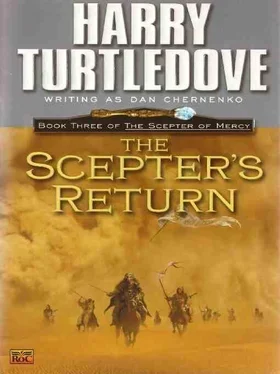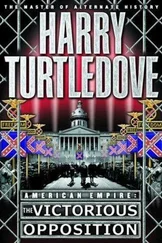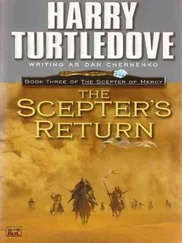Harry Turtledove - The Scepter's return
Здесь есть возможность читать онлайн «Harry Turtledove - The Scepter's return» весь текст электронной книги совершенно бесплатно (целиком полную версию без сокращений). В некоторых случаях можно слушать аудио, скачать через торрент в формате fb2 и присутствует краткое содержание. Жанр: Фэнтези, на английском языке. Описание произведения, (предисловие) а так же отзывы посетителей доступны на портале библиотеки ЛибКат.
- Название:The Scepter's return
- Автор:
- Жанр:
- Год:неизвестен
- ISBN:нет данных
- Рейтинг книги:4 / 5. Голосов: 1
-
Избранное:Добавить в избранное
- Отзывы:
-
Ваша оценка:
- 80
- 1
- 2
- 3
- 4
- 5
The Scepter's return: краткое содержание, описание и аннотация
Предлагаем к чтению аннотацию, описание, краткое содержание или предисловие (зависит от того, что написал сам автор книги «The Scepter's return»). Если вы не нашли необходимую информацию о книге — напишите в комментариях, мы постараемся отыскать её.
The Scepter's return — читать онлайн бесплатно полную книгу (весь текст) целиком
Ниже представлен текст книги, разбитый по страницам. Система сохранения места последней прочитанной страницы, позволяет с удобством читать онлайн бесплатно книгу «The Scepter's return», без необходимости каждый раз заново искать на чём Вы остановились. Поставьте закладку, и сможете в любой момент перейти на страницу, на которой закончили чтение.
Интервал:
Закладка:
Otus didn't think so. A smile on his face, the former thrall said, "It freed my folk." He shook his head and bowed to Grus and Pterocles. "Well, no. You two freed my folk. But the Scepter made sure they will stay free."
"So it did," Grus said. And the Scepter had let him impose his will on the Banished One. With it in his hand, he'd been, for a little while, as great as — greater than — the exiled god. He had been… but now, again, he wasn't. He snapped his fingers.
"What is it, Your Majesty?" Pterocles asked.
"Where do I go from here?" Grus had a question of his own.
The wizard frowned. "I don't understand."
"Where do I go from here?" Grus repeated. At last he did understand at least some of what was troubling him. "Where?" he said yet again. "What's left for me to do, after I've done this!" He pointed to the Scepter.
"Why, live happily ever after." That wasn't Pterocles but Otus. He went on, "By the gods in the heavens, if anyone's ever earned the right, you're the man."
Slowly, Grus shook his head. "This isn't a fairy tale, I'm afraid. I wish it were. I've spent a lot of years matched against the Thervings and the Chernagors and the Menteshe and our own nobles. I've fought and I've schemed and I've plotted. Lanius worked out how to get the Scepter back from Yozgat, and I went and did it. I did it, and I used the Scepter the way you said, Otus — and now what can I possibly do for the rest of my days that will matter even a tenth as much?"
"Oh," Pterocles said softly. "Now I see."
Otus still looked puzzled. He had what he wanted — his soul to call his own and his woman to call his own, too — and he was content. What Grus had was the certain knowledge that he'd already done the greatest deeds of his life. He was proud of them, yes, but they made everything that might come after feel like an anticlimax.
And how many years of anticlimax did he have to look forward to? No way for him to be sure, of course. Perhaps the gods in the heavens were sure of such things. If so, keeping it to themselves was one of the few kindnesses they showed mortal men.
Grus turned away from the Scepter of Mercy. Getting what you'd always wanted your whole life long was wonderful. Having it in front of you and knowing you would never want anything as much again as long as you lived — and also knowing that nothing you did want would be of any great consequence next to what you already had — was daunting.
For a moment, he imagined he heard laughter far off in the distance. Then he realized he wasn't imagining it; it was a servant somewhere halfway across the palace. A sigh of relief escaped him. He'd feared it was the Banished One, getting the last laugh after all.
He looked south, as he'd hardly done since coming back to the city of Avornis. Suppose the exiled god had gotten what he always wanted. Suppose he'd been able to master the Scepter of Mercy and regain rule in the heavens. Would he have lived happily ever after? Or would even limitless domination have palled after a while? Grus didn't know, of course. By the nature of things, he couldn't know how things would have gone for the Banished One. But he knew how he would guess.
It also occurred to him that the Banished One didn't know how lucky he was, not to have gotten his heart's desire. He could go on scheming and plotting and trying to come up with ways to get the Scepter of Mercy out of the hands of the Kings of Avornis. That wouldn't be so easy now, not since Grus had enjoined him against using any of the surrounding peoples against the kingdom. But the exiled god could keep on trying. Since he hadn't gotten his heart's desire, his existence still held purpose.
Grus wished he could be sure the same held true for his own.
Lanius also found himself wondering what to do now that the Scepter of Mercy had returned to Avornis. He was better than Grus at finding ways to occupy his time. He wrote a long, detailed account of King Berto's visit to the capital. He feared Crex wouldn't read the account; his son hadn't shown much interest in How to Be a King. But even if Crex never did glance at it, it would stay in the archives. Some other king might find it useful one day — or, if not that, it might help keep the future king awake on a long, warm summer afternoon. That was immortality, of a sort.
Immortality of another sort made Sosia's belly bulge. Lanius hoped for a second son. Things would feel… safer if Crex had a brother. And who could say? Maybe the new child would have the scholarly temperament Crex lacked.
Sosia didn't worry about any of that. "I want this baby to come out," she said. "I'm tired of looking like I swallowed a pumpkin. I'm even tireder of squatting over a chamber pot gods only know how many times a day."
"I'm sorry," Lanius said. "I can't do anything about that."
She sent him a glance half affectionate, half annoyed. "You did have something to do with this business, you know."
"Well, yes," he admitted.
"I just wish Queen Quelea had found a better way to go about it," his wife said. She eyed him again. "Can the Scepter of Mercy do anything about that! It would be a mercy if it could."
"I don't know, but I wouldn't think so," Lanius answered, flabbergasted. "There's nothing in the archives about using it for anything like that, anyhow."
Sosia sighed. "I might have known. Of course, men wouldn't think to use it against the pangs of childbirth. They're men!" She brightened, but only for a moment. Then gloom returned. "Their wives would have thought of it, though. I'm sure of that. So I suppose you're right. Too bad."
Remembering the cries he'd heard from women in labor, Lanius found himself nodding. "I'll use it when your time comes," he promised. "I'm sure of one thing — it can't hurt you."
"Thank you," Sosia said. "You do care about me, when — "
"Of course I do," Lanius interrupted.
But Sosia hadn't finished, and she intended to. "When you're not thinking about old parchments in the archives, or about your moncats -
"
He tried interrupting again. "If it weren't for Pouncer and things I found in the archives, we wouldn't have the Scepter of Mercy, I don't think we would, anyway," Grus might have been able to break into Yozgat, but even the other king didn't think it would have been easy.
Sosia waved Pouncer — and the Scepter — aside, too. "Or about your serving girls." That was where she'd been heading all along.
The funny thing was that, even if she didn't — and wouldn't — understand as much, she was right to lump the maidservants with the documents and the animals. They were a hobby. He enjoyed them, but after Cristata he'd never conceived a passion for any of them. But that wasn't what Sosia wanted to hear. Lanius knew exactly what she wanted to hear, and he said it. "I'm sorry, dear."
"A likely story." She didn't look too unhappy, though. That was what she'd wanted to hear, and he couldn't very well say anything more.
He was in the archives later that day — by himself — when rustling behind a cabinet way off in a dim corner of the room showed he wasn't quite by himself after all. He thought he knew what that rustling meant, and he proved right. In due course, Pouncer came out. The moncat walked up to the king and dropped most of a mouse at his feet.
"Mrowr," Pouncer said, as though making sure Lanius understood the magnitude of the gift. As far as the moncat was concerned, this was more important than the Scepter of Mercy. The Scepter had just been a thing. A mouse was food.
"Yes, I know what a wonderful fellow you are," Lanius said. He scratched the moncat behind the ears and at the sides of the jaw and gently rubbed its velvet nose. In due course, Pouncer rewarded him with a rusty purr. That was about as big a reward as any cat ever gave. It made Lanius wonder why people kept them. He supposed the dead and mangled mouse on the floor represented a partial answer, but it didn't seem enough.
Читать дальшеИнтервал:
Закладка:
Похожие книги на «The Scepter's return»
Представляем Вашему вниманию похожие книги на «The Scepter's return» списком для выбора. Мы отобрали схожую по названию и смыслу литературу в надежде предоставить читателям больше вариантов отыскать новые, интересные, ещё непрочитанные произведения.
Обсуждение, отзывы о книге «The Scepter's return» и просто собственные мнения читателей. Оставьте ваши комментарии, напишите, что Вы думаете о произведении, его смысле или главных героях. Укажите что конкретно понравилось, а что нет, и почему Вы так считаете.












